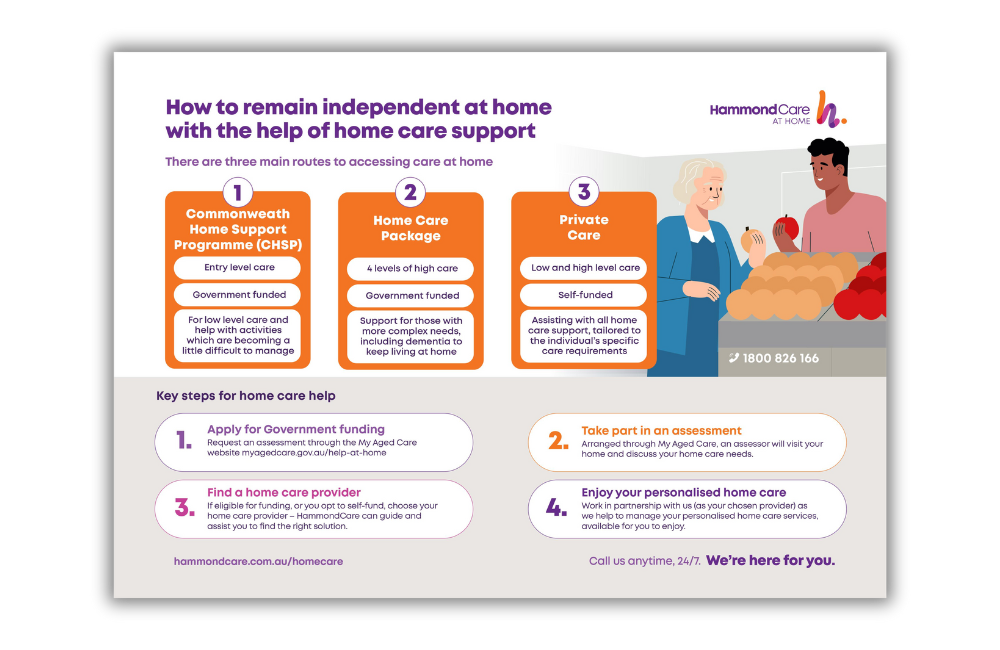The Importance of Home Care in Special Needs Support: Discovering NDIS Registered Solutions
Home treatment is a fundamental facet of impairment assistance, especially within the framework of NDIS registered services. It gives important solutions that cultivate independence and improve overall high quality of life for people with handicaps. By supplying personalized help, these services accommodate distinct demands and choices. Nevertheless, the efficiency of home care counts on ongoing interaction with NDIS organizers. This vibrant connection reveals deeper understandings right into the transformative possibility of tailored support. What difficulties and successes emerge in this developing landscape?
Comprehending the Duty of Home Care in Special Needs Assistance
Home care plays a vital duty in the assistance of individuals with handicaps, giving substantial solutions that promote self-reliance and improve top quality of life. It includes an array of aid customized to fulfill the one-of-a-kind demands of each person, consisting of individual treatment, household jobs, and movement support. Trained caregivers provide companionship and emotional support, cultivating purposeful connections that combat social isolation.Furthermore, home care services are made to adapt as circumstances alter, ensuring that people receive the appropriate level of treatment throughout their lives. This flexibility enables for the integration of brand-new therapies or technologies that might arise. By focusing on the person's routines and choices, home treatment equips them to preserve control over their day-to-day tasks. Eventually, the function of home treatment in disability support is essential, as it not just offers sensible help however also attests the self-respect and freedom of those it serves.

Benefits of Personalized Assistance at Home
Individualized help at home deals various benefits tailored to specific demands - support at home. By producing personalized assistance plans, caregivers can considerably enhance the self-reliance of people with impairments. This strategy not only promotes freedom but also promotes a feeling of dignity and self-regard
Customized Assistance Plans
Tailored assistance strategies play a vital function in enhancing the lifestyle for people with specials needs. These customized strategies are made to attend to the one-of-a-kind requirements and preferences of each person, guaranteeing that support solutions straighten with their details goals and way of life. By involving customers in the planning process, tailored assistance plans cultivate a sense of ownership and empowerment. This customized method enables caregivers to provide appropriate aid, whether it entails daily living activities, social interaction, or skill development. In addition, tailored strategies can adjust to changing situations, mirroring the evolving requirements of the person. Eventually, this customized assistance improves not only everyday operating yet likewise psychological well-being, reinforcing the relevance of a customized technique in impairment support services.
Enhanced Self-reliance Opportunities
People with specials needs benefit considerably from customized support at home, as it advertises enhanced freedom chances. Customized assistance allows individuals to participate in day-to-day activities with greater confidence and freedom. Home care services can consist of help with personal treatment, meal preparation, and house management, allowing customers to keep their regimens and preferences. This customized technique promotes a feeling of control, empowering people to make choices that reflect their unique demands and goals. Additionally, the convenience of home develops an acquainted atmosphere, minimizing stress and anxiety and enhancing psychological well-being. In general, customized support not only supports crucial daily tasks yet likewise cultivates a much more independent lifestyle, allowing individuals with handicaps to flourish within their areas and accomplish higher individual satisfaction.
Review of NDIS Registered Home Treatment Solutions
NDIS signed up home care services encompass different kinds of assistance customized to people with disabilities (home care package providers). Understanding qualification and accessibility to these services is essential for optimizing the benefits of NDIS assistance. This summary will highlight the essential facets of home care under the NDIS framework
Sorts Of Home Care
Home treatment solutions play a necessary function in supporting people with impairments, using a series of choices to fulfill diverse demands. NDIS signed up home treatment solutions include individual care, which assists people with everyday tasks like bathing and dressing. Domestic aid assists maintain a risk-free and tidy living setting, while respite treatment offers short-lived alleviation for primary caretakers. Area gain access to services make it possible for engagement in leisure and social activities, fostering self-reliance and connection. Additionally, nursing care supplies medical support at home, making certain health and wellness needs are met. Therapy solutions, including work and physiotherapy, help in rehab and skill development. With each other, these different types of home treatment contribute greatly to boosting the high quality of life for individuals with disabilities.
Eligibility and Access
How can one access the vital home treatment solutions offered under the NDIS? To get these services, individuals need to satisfy certain eligibility requirements outlined by the National Impairment Insurance Scheme. Applicants have to show a irreversible and significant impairment that impacts their daily performance. The process starts with sending an Access Demand Kind, which includes documents of the special needs and its effect on life. Once approved, individuals obtain a customized plan detailing their required assistances, consisting of home care solutions. These services can be accessed with NDIS-registered suppliers, check it out who should comply with stringent quality and security standards. Understanding these steps guarantees individuals can effectively browse the NDIS system to acquire the needed support for their home care requirements.
Advantages of NDIS Assistance
Accessing crucial assistance via registered solutions provides individuals with specials needs a transformative chance to boost their lifestyle. NDIS registered home care services supply customized aid, making certain that each individual's special requirements are met. These services include a vast array of supports, including personal treatment, flexibility support, and restorative services, all made to advertise self-reliance and wellness. Additionally, signed up suppliers stick to extensive high quality criteria, guaranteeing a high level of treatment and safety. Participants likewise take advantage of increased versatility, enabling them to choose service distribution methods that best match their lifestyles. Eventually, NDIS support promotes a feeling of area and empowerment, making it possible for people with handicaps to involve even more fully in their every day lives and attain personal objectives.
Tailoring assistance to private demands is important in disability care, as each person's situations and preferences differ considerably. The National Impairment Insurance Scheme (NDIS) stresses the value of personalized treatment plans that reflect the one-of-a-kind objectives and demands of each individual. This strategy allows caregivers to concentrate on specific locations such as movement support, daily living abilities, and emotional support, making sure that solutions are effective and relevant.
Enhancing Top Quality of Life With Home Care
While many people with disabilities face one-of-a-kind challenges, home care solutions can substantially improve their lifestyle by providing customized support in familiar environments. These solutions cultivate self-reliance, permitting individuals to participate in day-to-day activities that advertise self-worth and individual gratification. Through tailored care strategies, home care suppliers can resolve details needs, whether it entails help with individual hygiene, meal preparation, or medicine management.Moreover, home treatment helps with social interactions, motivating connections with friends and family, which are vital for emotional wellness. By continuing to be in their very own homes, individuals experience a feeling of stability and connection, decreasing stress and anxiety connected with unfamiliar environments. In addition, caretakers can provide friendship, aiding to relieve feelings of isolation. Overall, home treatment not only addresses physical demands yet likewise enriches the psychological and social dimensions of life for individuals with impairments, ultimately resulting in a much more meeting and pleasurable existence.
Browsing the NDIS for Home Care Solutions
Assisting through the National Disability Insurance Policy Plan (NDIS) can considerably affect the efficiency of home treatment solutions for individuals with handicaps. Comprehending the NDIS structure is essential for participants seeking proper financing for home treatment services. This procedure starts with determining specific demands and goals, which aids in customizing support strategies that align with the individual's requirements.Navigating the NDIS includes familiarizing oneself with the eligibility criteria, application treatments, and the planning process. Individuals need to engage with NDIS organizers to discuss their particular circumstances and preferred end results. This discussion assures that the necessary home care solutions, such as personal treatment, help with daily living, and therapeutic assistance, are included in their plans.Furthermore, remaining upgraded on NDIS policies and any adjustments in financing can empower participants to make informed selections regarding their home care options, inevitably boosting their self-reliance and lifestyle.
Success Stories: Empowering Lives With Home Care
Home treatment services have changed the lives of lots of individuals with disabilities, demonstrating the extensive impact of additional resources personalized support. Sarah, a young female with cerebral palsy, obtained self-reliance with customized home care support that allowed her to participate and manage day-to-day tasks in neighborhood tasks. Similarly, John, who has autism, benefited from a specialized caregiver that aided him develop social abilities and foster meaningful partnerships, enhancing his lifestyle. These success stories highlight how home treatment not only meets physical demands however additionally advertises psychological health. Families report enhanced comfort, recognizing their liked ones receive professional and thoughtful assistance in a familiar atmosphere. As these instances illustrate, home treatment encourages people with handicaps to prosper, motivating self-sufficiency and boosting overall life fulfillment. The transformative effects of such services highlight the importance of home care in the more comprehensive context of impairment assistance.

Often Asked Concerns
How Can I Locate NDIS Registered Home Treatment Providers in My Location?
To find NDIS signed up home care service providers in a specific area, individuals can see the NDIS website, use the company finder device, or call neighborhood impairment assistance companies for referrals and support.
What Qualifications Should Home Treatment Workers Possess for Handicap Support?
Home treatment employees for disability support should preferably possess qualifications such as a Certification III in Individual Support, relevant experience, solid communication abilities, empathy, and knowledge of disability civil liberties and person-centered care methods.
Exist Any Prices Associated With NDIS Registered Home Treatment Providers?
Expenses connected with NDIS registered home treatment services can differ based upon specific demands, company, and the degree of treatment required. Individuals should review their plans to understand details funding and possible out-of-pocket expenses.
Can Home Treatment Provider Accommodate Certain Social or Language Demands?

Just How Typically Can I Change My Home Care Assistance Plan?
Individuals can usually change their home treatment assistance plan as needed, frequently a minimum of each year or upon substantial life modifications. Routine evaluations guarantee that the plan remains relevant and properly addresses advancing individual situations and requirements. Trained caretakers offer companionship and emotional support, promoting significant connections that battle social isolation.Furthermore, home care solutions are developed to adjust as situations change, ensuring that individuals receive the ideal degree of treatment throughout their lives. Home care services can include assistance with individual care, meal prep work, and household monitoring, making it possible for customers to maintain their regimens and preferences. NDIS signed up home care services consist of personal treatment, which aids individuals with day-to-day tasks like bathing and dressing. With tailored care plans, home care companies can resolve details requirements, whether it involves assistance with individual health, meal preparation, or medication management.Moreover, home care helps with social interactions, encouraging connections with family and good friends, which are necessary for emotional well-being. Prices connected with NDIS signed up home care solutions can differ based on individual needs, service suppliers, and the level of care required.